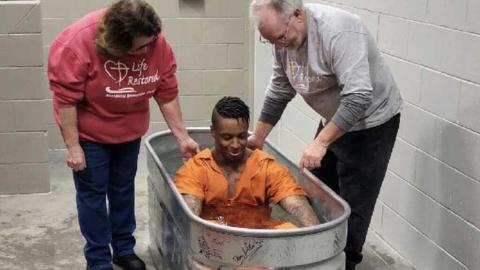'The Beautiful Thing': Churches, Faith-Based Groups Respond to Foster Crisis
GRAND RAPIDS, MI – America's opioid crisis is literally driving children from their homes and faith leaders are looking for creative ways to respond.
The government says the number of children in foster care shot up by 10 percent from 397,000 in 2012 to 437,500 in 2016.
At the end of Fiscal Year 2017, the Department of Health and Human Services reported more growth – 443,000 children in the system.
Naomi Schaefer Riley, an American Enterprise Institute fellow who studies child welfare, says the trend reverses what had been a decline for much of the late 90s and 2000s, following a peak in the 1980s driven by the crack epidemic.
She and a number of experts believe that the opioid crisis is helping to drive the growing number of children unable to stay in their homes.
The Need for Foster Parents
"It's the largest driver right now in the US for foster care," says Chris Palusky, CEO for Grand Rapids-based Bethany Christian Services. "we're seeing this opioid crisis just grow and it's causing families to be separated and it's also causing kids to be born into addiction."
It's why Bethany and other faith-based groups are racing to find new ways to recruit foster parents and care for these children.
Their hope lies in newly licensed foster parents like Matt and Liz Schulte who have cared for three children with special needs since they started three years ago. Both Matt and Liz work in health care and say that advocating for children with medical issues and developmental delays comes easily.
"It only takes us a few weeks with the kids before you feel solely responsible for them and feel like 'I have to do everything I can for these kids' because at the end of the day they're sleeping in our home and they're a part of our family for as long as they're here and you know it's so important that they have those parents that are going to fight for them," Liz told CBN News.
Unfortunately, many children in opioid-affected homes do not have such help. In some of the hardest-hit states like Ohio, children in foster care double the number of licensed parents.
In Georgia, the foster population has jumped by 76 percent in the last five years and in New Hampshire, it has doubled since 2015. In West Virginia, the state estimates that four out of five of its foster care children come from homes with substance abuse.
And while the opioid epidemic started in rural America it has now spread to the suburbs and cities, creating demand for foster parents across the country.
How the Opioid Crisis Traumatizes Children
Cheri Williams is a regional director for Bethany and says she sees the epidemic driving children from their homes. "It's not a drug that discriminates so really, it's everywhere," she told CBN News.
Williams oversees the Bethany staff that trains foster parents to receive these children. Often, she says, foster parents are welcoming children who've not been fed, clothed or taken care of in their own home.
"Trauma is not always the overt abuse, physical abuse, sexual abuse. Trauma is also neglect. And so, while some children from an opioid home, may have endured outward abuse – many have endured neglect," said Williams.
For many children, that neglect starts before they're even born. Addicted at birth, they must go through withdrawal and then into the arms of foster parents like Bob and Sue Wierenga.
"The majority of our babies were from mothers that were on drugs during pregnancy. You don't see the withdrawals in the hospital," said Sue Wierenga, "but then you see, as the months come along, how behind they are."
The Wierengas have witnessed a multitude of post-addiction problems over their 30 years as foster parents with Bethany. They include speech delays, eating problems and social issues.
How Faith-Based Groups are Helping
For decades, states have relied heavily on faith-based organizations to help meet foster care and adoption needs. Now, they're turning to these groups for fresh approaches to meet the growing demand. Naomi Schaefer Riley points to groups like the Global Orphan Project which recently created a website to connect social workers with churches.
Adrien Lewis is the executive director of ministry and tells CBN News that its new platform is helping to stabilize families whose children are at risk for entering the foster system. Its care portal allows social workers to post the specific needs of families ranging from diapers and clothing to help paying bills.
Churches can respond in real time to needs in their area. So far, more than 1,700 churches have responded and helped 33,000 children in 18 states.
"The beautiful thing is that when the church gets involved – they are meeting these families where they are," said Lewis. Often, he says, the problem is that churches are unaware of needs right in their own communities.
Riley says that other faith-based groups are going directly to churches. "Going into particular churches, particular parishes, congregations and going to the pulpit and saying 'these are the seven kids in your zip codes who need a home tonight' actually had a really big effect. People were unaware that the problem was so local, that it was so immediate and that it was so severe but when it came to their own community I think they were much more willing and interested in stepping up," she said.
Foster parents like the Schultes don't seek recognition or fame. And the Wierengas even face some resistance from friends concerned about their advancing age. But there are no plans to quit. "I'm planning on doing this till my health won't let me," said Sue Wierenga as she held her foster baby and kept an eye on a nearby foster toddler, "when I can't keep up with them anymore."




